
How-To
Thought leadership: What is it and do you need it?
Thought leadership: What is it and do you need it?
Thought leadership: What is it and do you need it?
Oct 22, 2024


Written by
Vinayak Agarwal
Let’s face it—standing out in today’s noisy digital landscape isn’t easy. Whether you’re a business owner, a coach, or a creative professional, having a great product or service is just half the battle. To truly rise above the crowd, you need something extra. And that’s where thought leadership comes in.
But what exactly is thought leadership, and is it something you or your business truly needs?
This article aims to break down the concept of thought leadership, explore its significance, and help you determine whether you need to embrace it in your professional journey.
Understanding Thought Leadership
What Is Thought Leadership?
Thought leadership refers to delivering authentic and genuine content that draws on the author’s expertise, insights, and experiences. The aim is to share knowledge and influence others positively. It’s not self-promotion but adding value to your audience’s understanding of the industry.
Thought leadership involves creating value, building knowledge, and taking a clear stand on important topics. Some argue that thought leadership requires strong, sometimes controversial opinions, while others see it as being a subject matter expert (SME) who shares insights to influence a specific niche. In reality, it’s a mixture of both.
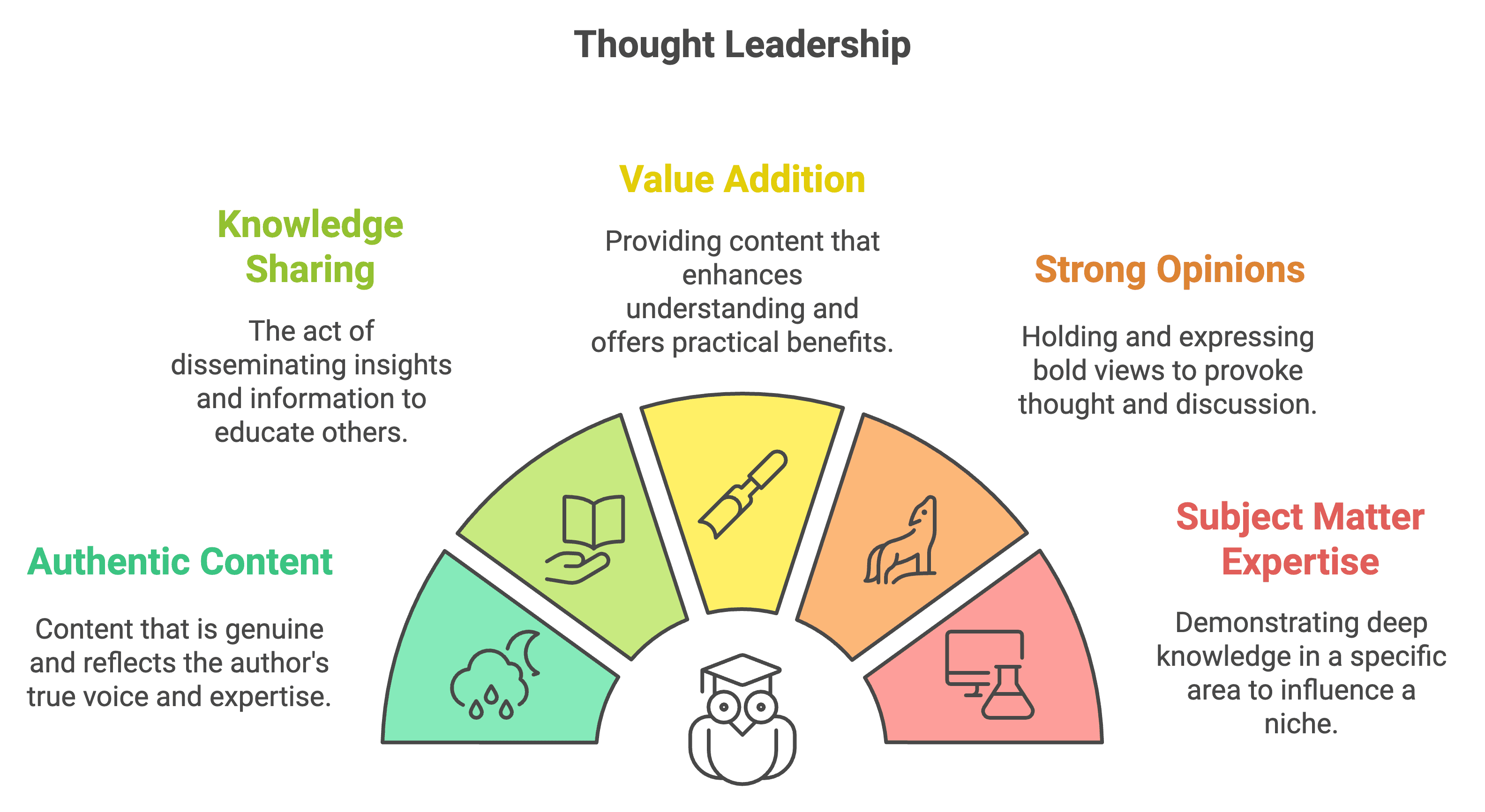
According to our research, thought leadership content that inspires change and creates educational value is the most impactful.
Thought Leadership Meaning
Thought leadership is about becoming a trusted authority. It means presenting well-researched, inspirational content that positions you or your brand as a go-to resource in your field. It requires more than just opinions; it requires sharing wisdom that sparks change.
For example, think about Simon Sinek, the author of Start With Why. He didn’t just release a book and call it a day—he became the go-to expert on leadership and purpose-driven business, consistently sharing ideas that resonate with leaders worldwide. Sinek’s thought leadership didn’t just sell books—it built a community of people who trust his perspective and seek his guidance.

Now, ask yourself: could you be the Simon Sinek of your industry?
Why Is Thought Leadership Important?
You might be wondering, “Why should I care about being a thought leader?” Well, here are a few compelling reasons:
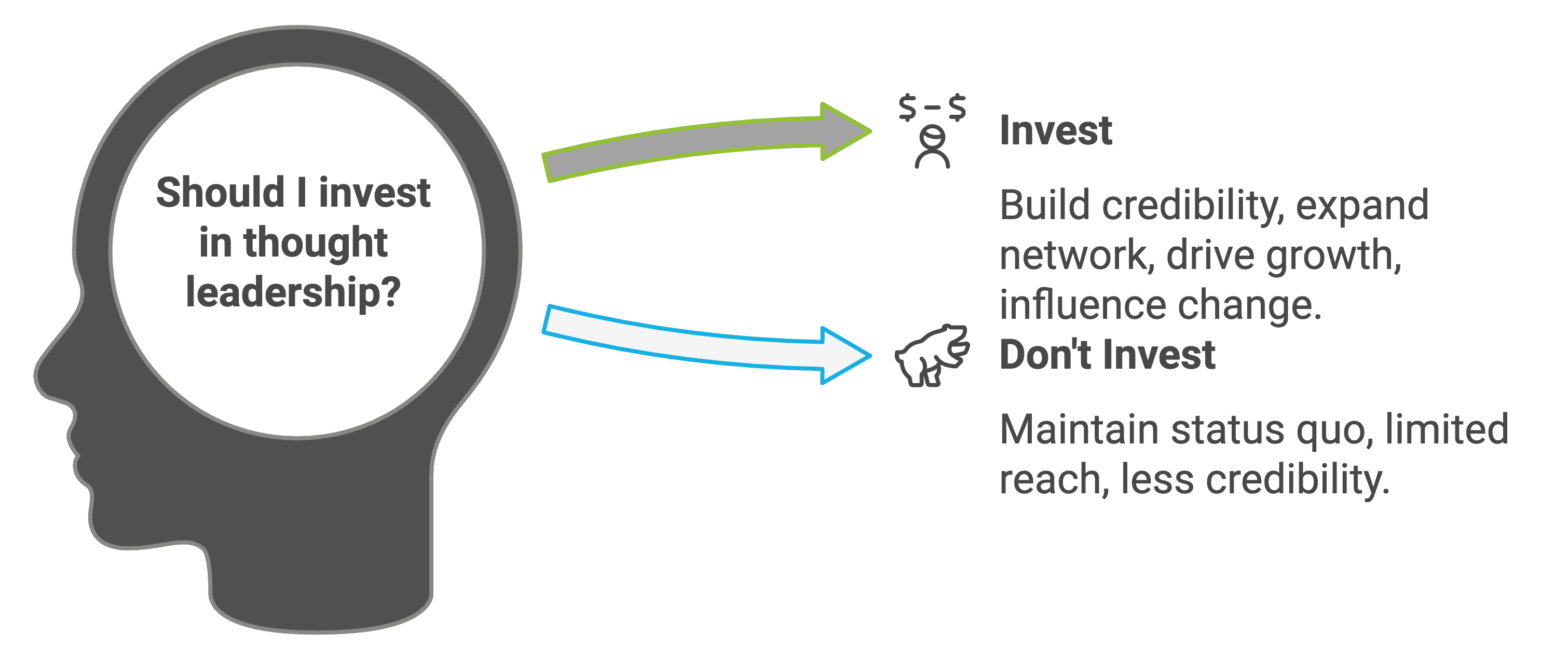
Builds Credibility: Establishing yourself as a thought leader can significantly enhance your credibility. When people see you as an expert, they are more likely to trust your opinions and recommendations.
Expands Your Network: Thought leadership can open doors to new connections. As you share your insights, you attract like-minded individuals and organizations, which can lead to collaborations and opportunities.
Drives Business Growth: For businesses, having a thought leader can be a game-changer. It can help differentiate your brand in a crowded market, attract customers, and even lead to increased sales.
Influences Change: Thought leaders often have the power to shape conversations and drive change within their industries. If you’re passionate about a cause or an idea, thought leadership can be a powerful platform to advocate for it.
Do You Need Thought Leadership?
Not everyone needs to be a thought leader, but it can be incredibly powerful for the right person or business. Here’s when thought leadership can be a game-changer for you:
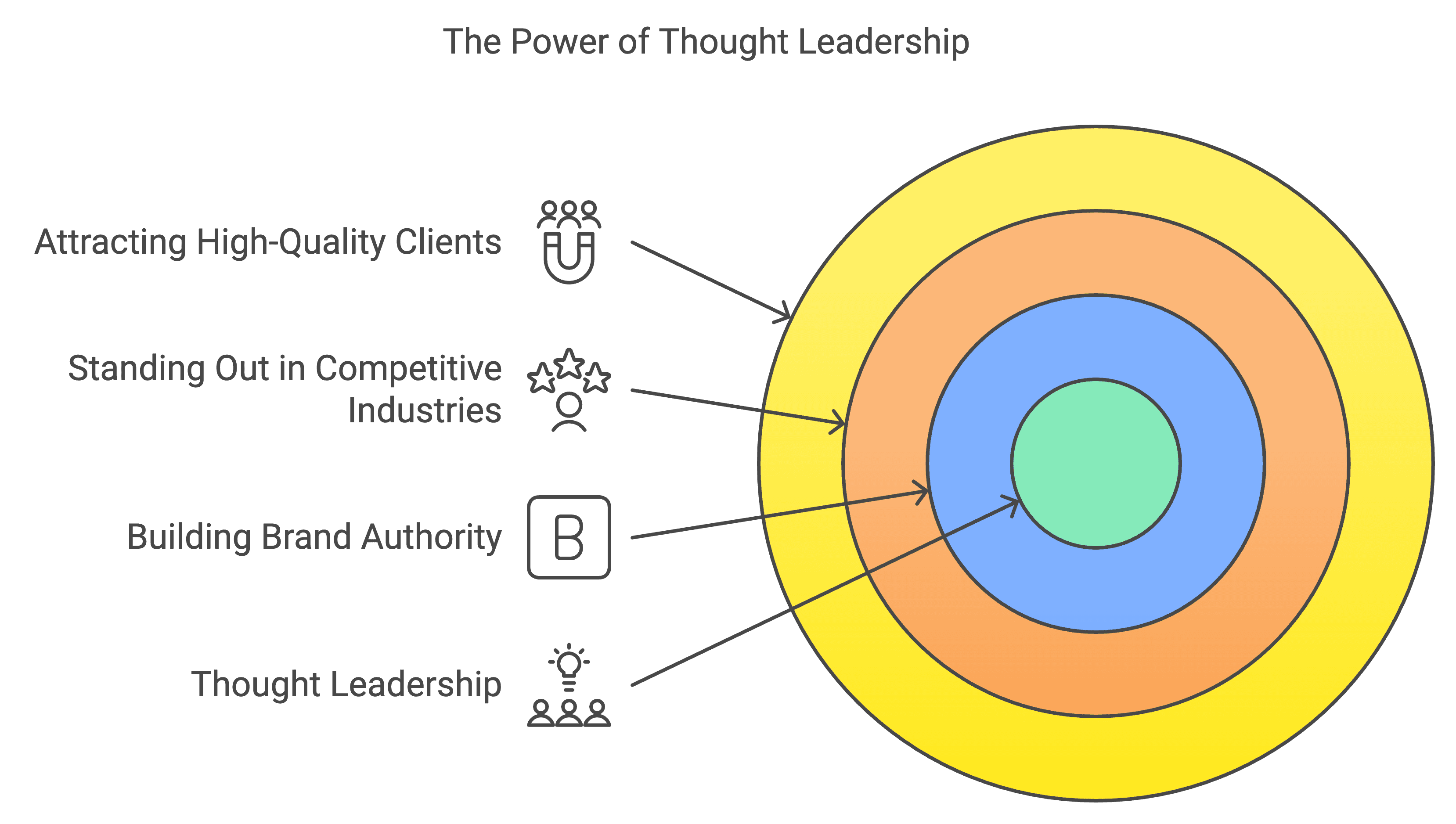
1. You Want to Build Brand Authority
If you’re aiming to become the go-to expert in your niche, thought leadership is essential. It helps build your credibility so that when people think about your industry, they think of you. Whether you’re a CEO, consultant, or even a startup, thought leadership can give you a voice of influence that makes others pay attention.
Neil Patel, the digital marketing guru, became a household name in the marketing space not because he talks about marketing trends, but because he teaches and guides others on how to use those trends effectively.
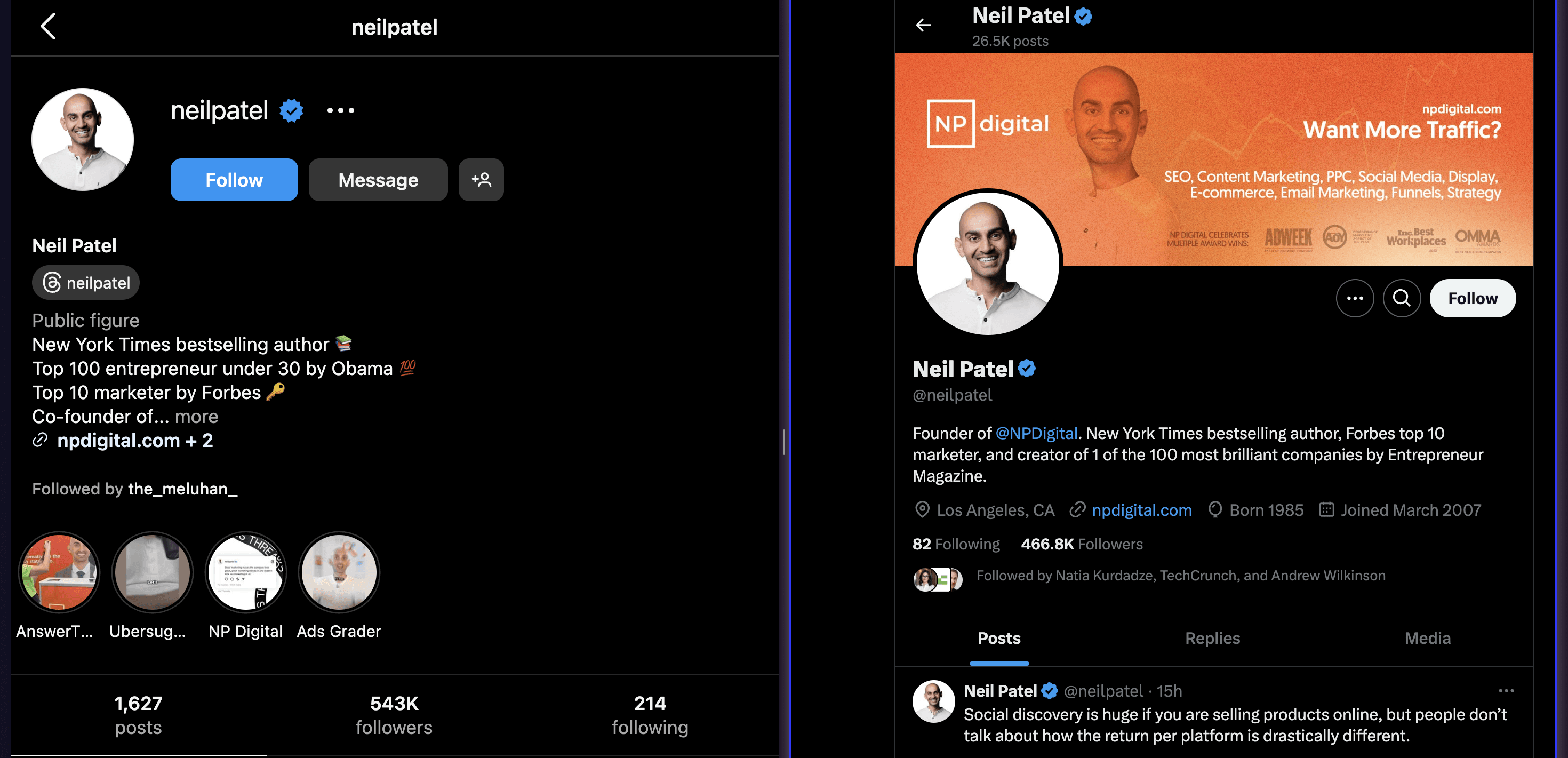
He doesn’t just drop buzzwords—he dives deep into real data, sharing actionable strategies that businesses can apply immediately. As a result, when people think about SEO or content marketing, they turn to Neil Patel.
The takeaway? If you’re already an expert in something, don’t keep that knowledge to yourself. Share it generously, and watch how it builds your reputation and authority.
2. You’re in a Competitive Industry
Let’s say you’re in a crowded industry—maybe tech consulting, healthcare, or real estate. How do you make people choose you over the other 100 companies offering the same service? Thought leadership is a great way to show potential clients, “Hey, I don’t just know what I’m doing—I’m an expert at it.”
Look at Salesforce. The CRM space is incredibly competitive, but Salesforce didn’t just rely on having a good product. They actively produce research and insightful content around topics like AI, customer relationship management, and digital transformation. This constant thought leadership makes people look to Salesforce not just as a software vendor, but as a leader shaping the future of business technology. Their consistent content made them stand out, not just as another CRM company, but as an industry pioneer.
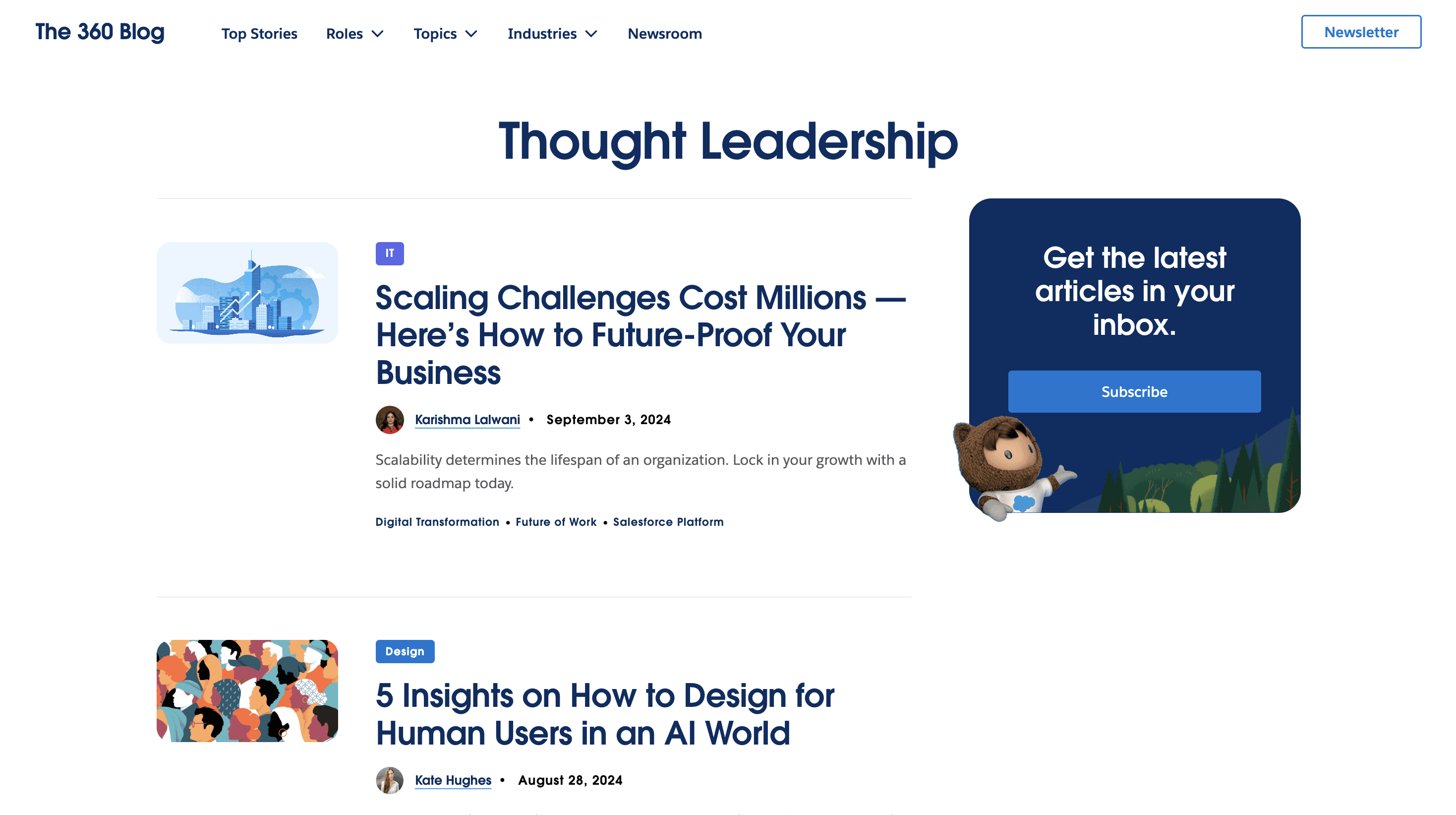
The lesson here? If you’re battling competition, be the voice that shapes the direction of your industry. Thought leadership can help you do that.
3. You Want to Attract High-Quality Clients
You might not know this yet, but thought leadership is like a magnet for high-quality clients. When you consistently share valuable insights, it builds trust. People start to see you as someone who knows their stuff—someone they want to work with.
Geri Stengel, the founder of Ventureneer, shared her thought leadership on women entrepreneurs and entrepreneurial funding.
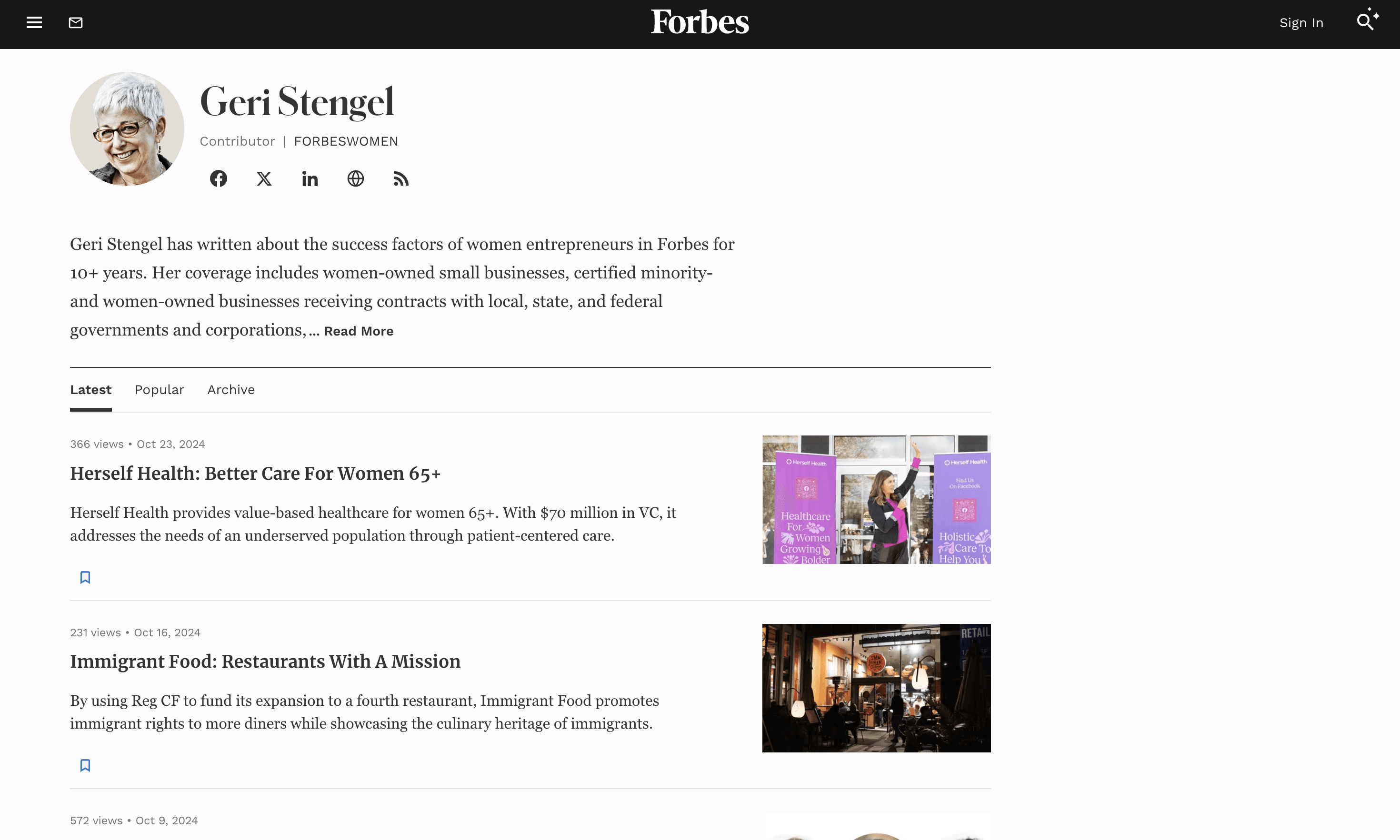
Over time, her content attracted new clients who were drawn to her deep knowledge and expertise. Her thought leadership did more than just increase visibility—it cut out the need for traditional client vetting because potential clients already trusted her through her content.
Here’s what you need to know: If you want to attract clients that value your expertise, thought leadership is the way in.
When Thought Leadership Isn’t the Right Fit
Thought leadership can be incredibly powerful, but it’s not the right strategy for every business. In some industries, like ecommerce or FMCG, the customer’s buying decision isn’t influenced by expert content or insightful thought pieces. Instead, people are more interested in price, convenience, or brand loyalty. Let’s talk about when thought leadership might not be the best use of your time and resources.
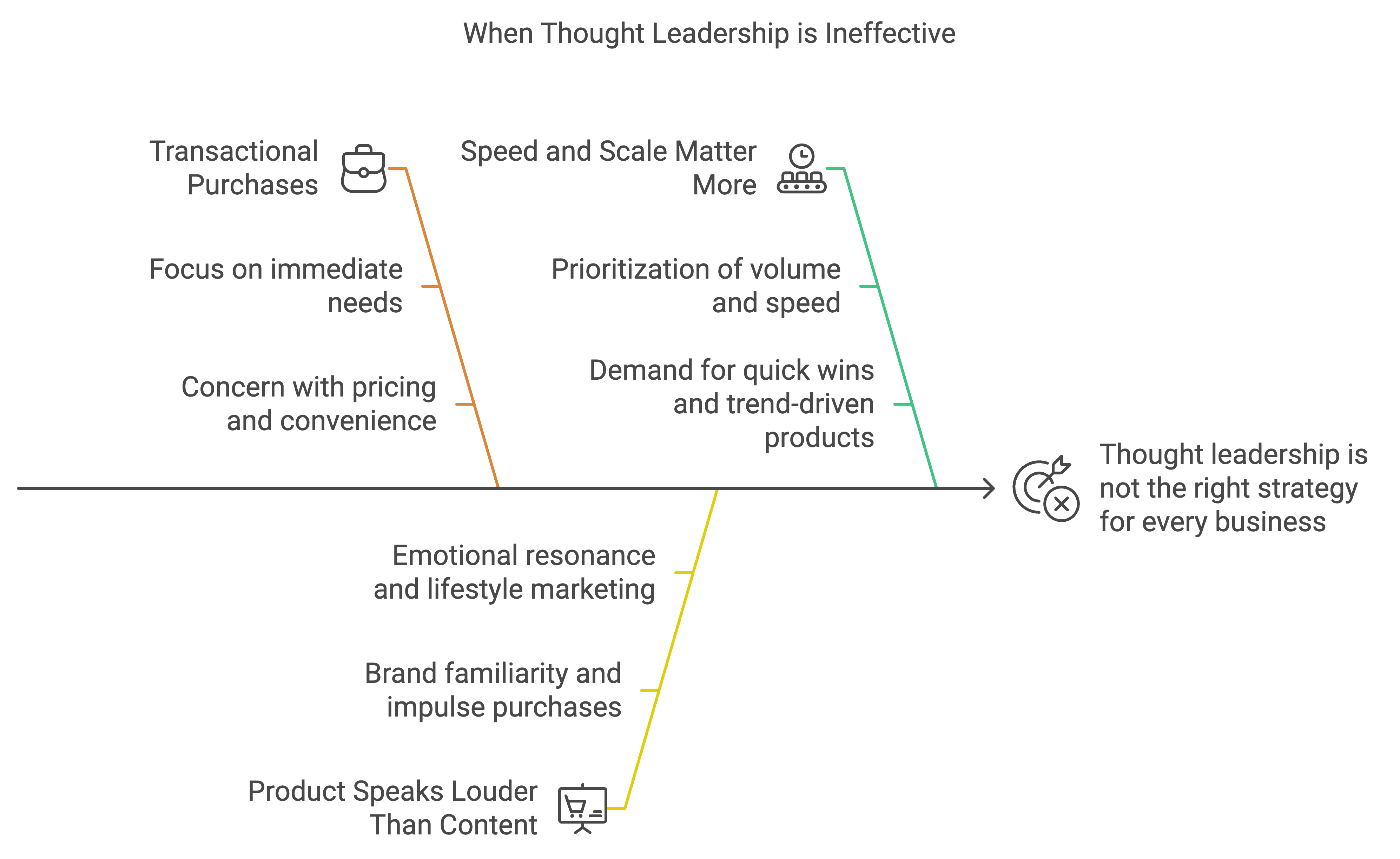
1. Transactional Purchases Don't Need Expertise
In industries where the product is commoditized or transactional, like ecommerce or FMCG, the focus is often on immediate needs rather than building long-term thought leadership. Customers in these spaces are more concerned with what’s on sale, how fast they can get the product, or whether it fits their lifestyle—they’re not usually looking for deep, educational content from the brand.
If you’re running an ecommerce business that sells consumer electronics or clothing, thought leadership won’t necessarily drive more sales. Customers are looking for product reviews, competitive pricing, and customer service excellence. While expertise on broader trends like sustainability might build some brand goodwill, it’s not what’s going to make the customer hit the “buy” button.
Here’s the truth: If you’re in an industry where purchasing decisions are more about convenience than knowledge, thought leadership might not give you the return on investment you’re hoping for. Instead, focusing on customer experience, pricing strategies, and brand positioning will be more effective.
2. When the Product Speaks Louder Than Content
In industries like FMCG, where decisions are often made based on brand familiarity and impulse purchases, thought leadership isn’t always the right fit. If you’re selling toothpaste, soft drinks, or snacks, customers don’t need (or want) an in-depth thought leadership article about the science behind your product. What they care about is availability, taste, or habit—not deep expertise.
Let’s take a company like Coca-Cola. They focus on branding and lifestyle marketing rather than positioning themselves as thought leaders. Coca-Cola’s customers don’t buy their products because the company provides deep industry insight—they buy them because of the brand’s emotional resonance, familiarity, and ubiquity.
For businesses like these, investing time and resources into thought leadership might be a misaligned strategy. Instead, the focus should be on brand-building, consumer engagement, and product innovation that keeps customers coming back.
3. When Speed and Scale Matter More
In industries that prioritize volume, speed, and efficiency—like fast fashion, grocery stores, or convenience goods—thought leadership may not be the best investment. If your business thrives on quick, repetitive sales, your audience isn’t likely to engage with long-form content or thought pieces. Instead, they want quick wins like discounts, limited-time offers, or trend-driven products.
Brands like Zara or H&M don’t rely on thought leadership to drive sales. Instead, they focus on reacting quickly to fashion trends and getting new styles into their stores as fast as possible. Their customers are looking for affordable, trendy clothing that they can wear today—not expertise about the future of the fashion industry.
Here’s the takeaway: If your business model relies on volume and speed over customer education, thought leadership might not be a priority. Instead, focus on strategies that emphasize fast service, product variety, or trend-setting.
So, Do You Really Need Thought Leadership?
At the end of the day, thought leadership isn’t a one-size-fits-all strategy. But if you’re committed to sharing your expertise, helping others, and standing out in your field, it can be an invaluable tool for building trust, attracting clients, and positioning yourself or your brand as a leader.
Not every industry or business benefits from thought leadership. If you’re in ecommerce, FMCG, or any business where impulse, price, or convenience are the main drivers of customer decisions, thought leadership may not directly impact your bottom line. In these cases, focusing on brand differentiation, product availability, and customer experience will likely yield better results.
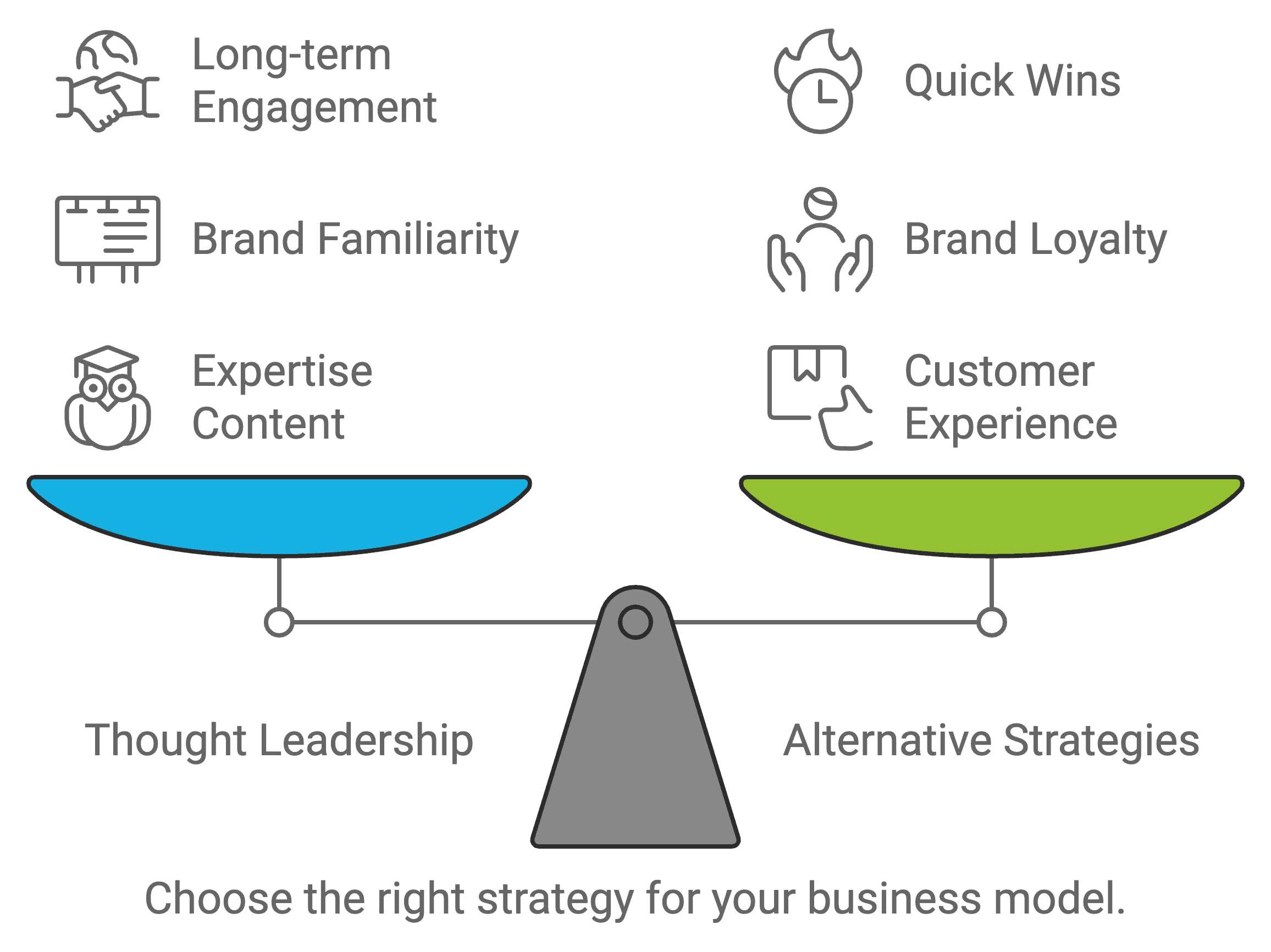
Before you start, ask yourself:
Do my customers need deep insights to make a purchasing decision?
Does my industry thrive on expertise, or are decisions more transactional?
Will thought leadership help me build the kind of brand trust and loyalty that I need?
If you answered yes to most of these questions, it’s time to take the leap into thought leadership. And remember, it’s not about perfection—it’s about authenticity, consistency, and value. You’ve got this!
Let’s face it—standing out in today’s noisy digital landscape isn’t easy. Whether you’re a business owner, a coach, or a creative professional, having a great product or service is just half the battle. To truly rise above the crowd, you need something extra. And that’s where thought leadership comes in.
But what exactly is thought leadership, and is it something you or your business truly needs?
This article aims to break down the concept of thought leadership, explore its significance, and help you determine whether you need to embrace it in your professional journey.
Understanding Thought Leadership
What Is Thought Leadership?
Thought leadership refers to delivering authentic and genuine content that draws on the author’s expertise, insights, and experiences. The aim is to share knowledge and influence others positively. It’s not self-promotion but adding value to your audience’s understanding of the industry.
Thought leadership involves creating value, building knowledge, and taking a clear stand on important topics. Some argue that thought leadership requires strong, sometimes controversial opinions, while others see it as being a subject matter expert (SME) who shares insights to influence a specific niche. In reality, it’s a mixture of both.

According to our research, thought leadership content that inspires change and creates educational value is the most impactful.
Thought Leadership Meaning
Thought leadership is about becoming a trusted authority. It means presenting well-researched, inspirational content that positions you or your brand as a go-to resource in your field. It requires more than just opinions; it requires sharing wisdom that sparks change.
For example, think about Simon Sinek, the author of Start With Why. He didn’t just release a book and call it a day—he became the go-to expert on leadership and purpose-driven business, consistently sharing ideas that resonate with leaders worldwide. Sinek’s thought leadership didn’t just sell books—it built a community of people who trust his perspective and seek his guidance.

Now, ask yourself: could you be the Simon Sinek of your industry?
Why Is Thought Leadership Important?
You might be wondering, “Why should I care about being a thought leader?” Well, here are a few compelling reasons:

Builds Credibility: Establishing yourself as a thought leader can significantly enhance your credibility. When people see you as an expert, they are more likely to trust your opinions and recommendations.
Expands Your Network: Thought leadership can open doors to new connections. As you share your insights, you attract like-minded individuals and organizations, which can lead to collaborations and opportunities.
Drives Business Growth: For businesses, having a thought leader can be a game-changer. It can help differentiate your brand in a crowded market, attract customers, and even lead to increased sales.
Influences Change: Thought leaders often have the power to shape conversations and drive change within their industries. If you’re passionate about a cause or an idea, thought leadership can be a powerful platform to advocate for it.
Do You Need Thought Leadership?
Not everyone needs to be a thought leader, but it can be incredibly powerful for the right person or business. Here’s when thought leadership can be a game-changer for you:

1. You Want to Build Brand Authority
If you’re aiming to become the go-to expert in your niche, thought leadership is essential. It helps build your credibility so that when people think about your industry, they think of you. Whether you’re a CEO, consultant, or even a startup, thought leadership can give you a voice of influence that makes others pay attention.
Neil Patel, the digital marketing guru, became a household name in the marketing space not because he talks about marketing trends, but because he teaches and guides others on how to use those trends effectively.

He doesn’t just drop buzzwords—he dives deep into real data, sharing actionable strategies that businesses can apply immediately. As a result, when people think about SEO or content marketing, they turn to Neil Patel.
The takeaway? If you’re already an expert in something, don’t keep that knowledge to yourself. Share it generously, and watch how it builds your reputation and authority.
2. You’re in a Competitive Industry
Let’s say you’re in a crowded industry—maybe tech consulting, healthcare, or real estate. How do you make people choose you over the other 100 companies offering the same service? Thought leadership is a great way to show potential clients, “Hey, I don’t just know what I’m doing—I’m an expert at it.”
Look at Salesforce. The CRM space is incredibly competitive, but Salesforce didn’t just rely on having a good product. They actively produce research and insightful content around topics like AI, customer relationship management, and digital transformation. This constant thought leadership makes people look to Salesforce not just as a software vendor, but as a leader shaping the future of business technology. Their consistent content made them stand out, not just as another CRM company, but as an industry pioneer.

The lesson here? If you’re battling competition, be the voice that shapes the direction of your industry. Thought leadership can help you do that.
3. You Want to Attract High-Quality Clients
You might not know this yet, but thought leadership is like a magnet for high-quality clients. When you consistently share valuable insights, it builds trust. People start to see you as someone who knows their stuff—someone they want to work with.
Geri Stengel, the founder of Ventureneer, shared her thought leadership on women entrepreneurs and entrepreneurial funding.

Over time, her content attracted new clients who were drawn to her deep knowledge and expertise. Her thought leadership did more than just increase visibility—it cut out the need for traditional client vetting because potential clients already trusted her through her content.
Here’s what you need to know: If you want to attract clients that value your expertise, thought leadership is the way in.
When Thought Leadership Isn’t the Right Fit
Thought leadership can be incredibly powerful, but it’s not the right strategy for every business. In some industries, like ecommerce or FMCG, the customer’s buying decision isn’t influenced by expert content or insightful thought pieces. Instead, people are more interested in price, convenience, or brand loyalty. Let’s talk about when thought leadership might not be the best use of your time and resources.

1. Transactional Purchases Don't Need Expertise
In industries where the product is commoditized or transactional, like ecommerce or FMCG, the focus is often on immediate needs rather than building long-term thought leadership. Customers in these spaces are more concerned with what’s on sale, how fast they can get the product, or whether it fits their lifestyle—they’re not usually looking for deep, educational content from the brand.
If you’re running an ecommerce business that sells consumer electronics or clothing, thought leadership won’t necessarily drive more sales. Customers are looking for product reviews, competitive pricing, and customer service excellence. While expertise on broader trends like sustainability might build some brand goodwill, it’s not what’s going to make the customer hit the “buy” button.
Here’s the truth: If you’re in an industry where purchasing decisions are more about convenience than knowledge, thought leadership might not give you the return on investment you’re hoping for. Instead, focusing on customer experience, pricing strategies, and brand positioning will be more effective.
2. When the Product Speaks Louder Than Content
In industries like FMCG, where decisions are often made based on brand familiarity and impulse purchases, thought leadership isn’t always the right fit. If you’re selling toothpaste, soft drinks, or snacks, customers don’t need (or want) an in-depth thought leadership article about the science behind your product. What they care about is availability, taste, or habit—not deep expertise.
Let’s take a company like Coca-Cola. They focus on branding and lifestyle marketing rather than positioning themselves as thought leaders. Coca-Cola’s customers don’t buy their products because the company provides deep industry insight—they buy them because of the brand’s emotional resonance, familiarity, and ubiquity.
For businesses like these, investing time and resources into thought leadership might be a misaligned strategy. Instead, the focus should be on brand-building, consumer engagement, and product innovation that keeps customers coming back.
3. When Speed and Scale Matter More
In industries that prioritize volume, speed, and efficiency—like fast fashion, grocery stores, or convenience goods—thought leadership may not be the best investment. If your business thrives on quick, repetitive sales, your audience isn’t likely to engage with long-form content or thought pieces. Instead, they want quick wins like discounts, limited-time offers, or trend-driven products.
Brands like Zara or H&M don’t rely on thought leadership to drive sales. Instead, they focus on reacting quickly to fashion trends and getting new styles into their stores as fast as possible. Their customers are looking for affordable, trendy clothing that they can wear today—not expertise about the future of the fashion industry.
Here’s the takeaway: If your business model relies on volume and speed over customer education, thought leadership might not be a priority. Instead, focus on strategies that emphasize fast service, product variety, or trend-setting.
So, Do You Really Need Thought Leadership?
At the end of the day, thought leadership isn’t a one-size-fits-all strategy. But if you’re committed to sharing your expertise, helping others, and standing out in your field, it can be an invaluable tool for building trust, attracting clients, and positioning yourself or your brand as a leader.
Not every industry or business benefits from thought leadership. If you’re in ecommerce, FMCG, or any business where impulse, price, or convenience are the main drivers of customer decisions, thought leadership may not directly impact your bottom line. In these cases, focusing on brand differentiation, product availability, and customer experience will likely yield better results.

Before you start, ask yourself:
Do my customers need deep insights to make a purchasing decision?
Does my industry thrive on expertise, or are decisions more transactional?
Will thought leadership help me build the kind of brand trust and loyalty that I need?
If you answered yes to most of these questions, it’s time to take the leap into thought leadership. And remember, it’s not about perfection—it’s about authenticity, consistency, and value. You’ve got this!
Let’s face it—standing out in today’s noisy digital landscape isn’t easy. Whether you’re a business owner, a coach, or a creative professional, having a great product or service is just half the battle. To truly rise above the crowd, you need something extra. And that’s where thought leadership comes in.
But what exactly is thought leadership, and is it something you or your business truly needs?
This article aims to break down the concept of thought leadership, explore its significance, and help you determine whether you need to embrace it in your professional journey.
Understanding Thought Leadership
What Is Thought Leadership?
Thought leadership refers to delivering authentic and genuine content that draws on the author’s expertise, insights, and experiences. The aim is to share knowledge and influence others positively. It’s not self-promotion but adding value to your audience’s understanding of the industry.
Thought leadership involves creating value, building knowledge, and taking a clear stand on important topics. Some argue that thought leadership requires strong, sometimes controversial opinions, while others see it as being a subject matter expert (SME) who shares insights to influence a specific niche. In reality, it’s a mixture of both.

According to our research, thought leadership content that inspires change and creates educational value is the most impactful.
Thought Leadership Meaning
Thought leadership is about becoming a trusted authority. It means presenting well-researched, inspirational content that positions you or your brand as a go-to resource in your field. It requires more than just opinions; it requires sharing wisdom that sparks change.
For example, think about Simon Sinek, the author of Start With Why. He didn’t just release a book and call it a day—he became the go-to expert on leadership and purpose-driven business, consistently sharing ideas that resonate with leaders worldwide. Sinek’s thought leadership didn’t just sell books—it built a community of people who trust his perspective and seek his guidance.

Now, ask yourself: could you be the Simon Sinek of your industry?
Why Is Thought Leadership Important?
You might be wondering, “Why should I care about being a thought leader?” Well, here are a few compelling reasons:

Builds Credibility: Establishing yourself as a thought leader can significantly enhance your credibility. When people see you as an expert, they are more likely to trust your opinions and recommendations.
Expands Your Network: Thought leadership can open doors to new connections. As you share your insights, you attract like-minded individuals and organizations, which can lead to collaborations and opportunities.
Drives Business Growth: For businesses, having a thought leader can be a game-changer. It can help differentiate your brand in a crowded market, attract customers, and even lead to increased sales.
Influences Change: Thought leaders often have the power to shape conversations and drive change within their industries. If you’re passionate about a cause or an idea, thought leadership can be a powerful platform to advocate for it.
Do You Need Thought Leadership?
Not everyone needs to be a thought leader, but it can be incredibly powerful for the right person or business. Here’s when thought leadership can be a game-changer for you:

1. You Want to Build Brand Authority
If you’re aiming to become the go-to expert in your niche, thought leadership is essential. It helps build your credibility so that when people think about your industry, they think of you. Whether you’re a CEO, consultant, or even a startup, thought leadership can give you a voice of influence that makes others pay attention.
Neil Patel, the digital marketing guru, became a household name in the marketing space not because he talks about marketing trends, but because he teaches and guides others on how to use those trends effectively.

He doesn’t just drop buzzwords—he dives deep into real data, sharing actionable strategies that businesses can apply immediately. As a result, when people think about SEO or content marketing, they turn to Neil Patel.
The takeaway? If you’re already an expert in something, don’t keep that knowledge to yourself. Share it generously, and watch how it builds your reputation and authority.
2. You’re in a Competitive Industry
Let’s say you’re in a crowded industry—maybe tech consulting, healthcare, or real estate. How do you make people choose you over the other 100 companies offering the same service? Thought leadership is a great way to show potential clients, “Hey, I don’t just know what I’m doing—I’m an expert at it.”
Look at Salesforce. The CRM space is incredibly competitive, but Salesforce didn’t just rely on having a good product. They actively produce research and insightful content around topics like AI, customer relationship management, and digital transformation. This constant thought leadership makes people look to Salesforce not just as a software vendor, but as a leader shaping the future of business technology. Their consistent content made them stand out, not just as another CRM company, but as an industry pioneer.

The lesson here? If you’re battling competition, be the voice that shapes the direction of your industry. Thought leadership can help you do that.
3. You Want to Attract High-Quality Clients
You might not know this yet, but thought leadership is like a magnet for high-quality clients. When you consistently share valuable insights, it builds trust. People start to see you as someone who knows their stuff—someone they want to work with.
Geri Stengel, the founder of Ventureneer, shared her thought leadership on women entrepreneurs and entrepreneurial funding.

Over time, her content attracted new clients who were drawn to her deep knowledge and expertise. Her thought leadership did more than just increase visibility—it cut out the need for traditional client vetting because potential clients already trusted her through her content.
Here’s what you need to know: If you want to attract clients that value your expertise, thought leadership is the way in.
When Thought Leadership Isn’t the Right Fit
Thought leadership can be incredibly powerful, but it’s not the right strategy for every business. In some industries, like ecommerce or FMCG, the customer’s buying decision isn’t influenced by expert content or insightful thought pieces. Instead, people are more interested in price, convenience, or brand loyalty. Let’s talk about when thought leadership might not be the best use of your time and resources.

1. Transactional Purchases Don't Need Expertise
In industries where the product is commoditized or transactional, like ecommerce or FMCG, the focus is often on immediate needs rather than building long-term thought leadership. Customers in these spaces are more concerned with what’s on sale, how fast they can get the product, or whether it fits their lifestyle—they’re not usually looking for deep, educational content from the brand.
If you’re running an ecommerce business that sells consumer electronics or clothing, thought leadership won’t necessarily drive more sales. Customers are looking for product reviews, competitive pricing, and customer service excellence. While expertise on broader trends like sustainability might build some brand goodwill, it’s not what’s going to make the customer hit the “buy” button.
Here’s the truth: If you’re in an industry where purchasing decisions are more about convenience than knowledge, thought leadership might not give you the return on investment you’re hoping for. Instead, focusing on customer experience, pricing strategies, and brand positioning will be more effective.
2. When the Product Speaks Louder Than Content
In industries like FMCG, where decisions are often made based on brand familiarity and impulse purchases, thought leadership isn’t always the right fit. If you’re selling toothpaste, soft drinks, or snacks, customers don’t need (or want) an in-depth thought leadership article about the science behind your product. What they care about is availability, taste, or habit—not deep expertise.
Let’s take a company like Coca-Cola. They focus on branding and lifestyle marketing rather than positioning themselves as thought leaders. Coca-Cola’s customers don’t buy their products because the company provides deep industry insight—they buy them because of the brand’s emotional resonance, familiarity, and ubiquity.
For businesses like these, investing time and resources into thought leadership might be a misaligned strategy. Instead, the focus should be on brand-building, consumer engagement, and product innovation that keeps customers coming back.
3. When Speed and Scale Matter More
In industries that prioritize volume, speed, and efficiency—like fast fashion, grocery stores, or convenience goods—thought leadership may not be the best investment. If your business thrives on quick, repetitive sales, your audience isn’t likely to engage with long-form content or thought pieces. Instead, they want quick wins like discounts, limited-time offers, or trend-driven products.
Brands like Zara or H&M don’t rely on thought leadership to drive sales. Instead, they focus on reacting quickly to fashion trends and getting new styles into their stores as fast as possible. Their customers are looking for affordable, trendy clothing that they can wear today—not expertise about the future of the fashion industry.
Here’s the takeaway: If your business model relies on volume and speed over customer education, thought leadership might not be a priority. Instead, focus on strategies that emphasize fast service, product variety, or trend-setting.
So, Do You Really Need Thought Leadership?
At the end of the day, thought leadership isn’t a one-size-fits-all strategy. But if you’re committed to sharing your expertise, helping others, and standing out in your field, it can be an invaluable tool for building trust, attracting clients, and positioning yourself or your brand as a leader.
Not every industry or business benefits from thought leadership. If you’re in ecommerce, FMCG, or any business where impulse, price, or convenience are the main drivers of customer decisions, thought leadership may not directly impact your bottom line. In these cases, focusing on brand differentiation, product availability, and customer experience will likely yield better results.

Before you start, ask yourself:
Do my customers need deep insights to make a purchasing decision?
Does my industry thrive on expertise, or are decisions more transactional?
Will thought leadership help me build the kind of brand trust and loyalty that I need?
If you answered yes to most of these questions, it’s time to take the leap into thought leadership. And remember, it’s not about perfection—it’s about authenticity, consistency, and value. You’ve got this!
